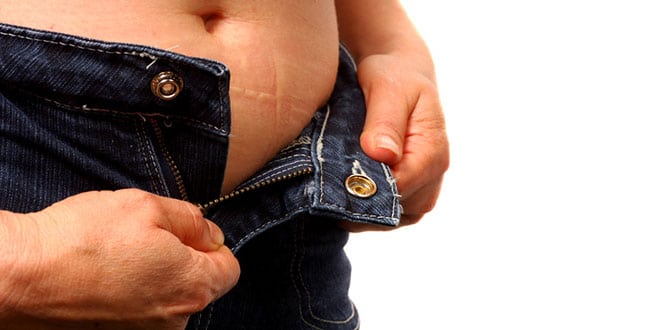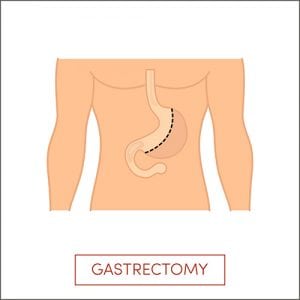
With sleeve gastrectomy, you can be full on less food.
A vertical sleeve gastrectomy is a surgical procedure that is performed to help you lose weight. In this procedure, the surgeon removes about 85 percent of your stomach. Your smaller stomach is about the size and shape of a banana. Because your stomach is smaller, you will not be able to eat as much.
- You will feel full and satisfied after eating a much smaller amount of food
- You and your weight loss surgery team will work together to help ensure that you achieve the best possible results from a sleeve gastrectomy
Before Sleeve Gastrectomy
Before the procedure, you will have several consultations with the surgeon and nutrition team to make sure that you are healthy enough and prepared for the surgery. You will have a complete physical exam, some blood tests and ultrasounds of your gallbadder and other abdominal organs. You may also have lung and heart tests. You may also need to make sure that other health conditions such as high blood pressure are under control before your surgery. To prepare you for weight loss, you will participate in nutritional counseling. This program is designed by the surgeon to help you develop a meal plan and make healthy food choices. Since you will not be able to eat as much food, the foods that you choose will need to be nutritious. You may also need to commit to some lifestyle changes such as ceasing smoking and increasing your level of physical activity. In the week before surgery, you may need to stop taking blood thinning medications that could slow down your recovery. On the day of the surgery, you will need to follow the surgeon’s instructions on when to stop eating and drinking.
How the Surgery Works
 Gastric sleeve surgery is performed while you are under general anesthesia. You will be asleep and free of pain for the duration of the surgery. The surgery usually takes about 60 minutes. The surgery involves making two to five incisions into your belly. A small camera called a laparoscope is inserted through one of the incisions. The camera allows your surgeon to see inside of your body without needing to make a large incision. The camera is connected to a monitor in the operating room so that your surgeon can see your abdominal organs. The surgeon operates on your stomach by passing the instruments through the small incisions. About 85 percent of your stomach is removed. The portion of your stomach that remains is held together with surgical staples and shaped like a long vertical tube. The sphincter muscles that allow food to pass into and out of your stomach are left intact. In some cases, doctors may recommend that your gallbladder be removed at the same time as the gastrectomy. This does not require any more incisions and can facilitate your digestive health during your recovery. Your surgeon then removes the instruments and camera and stitches your stomach closed.
Gastric sleeve surgery is performed while you are under general anesthesia. You will be asleep and free of pain for the duration of the surgery. The surgery usually takes about 60 minutes. The surgery involves making two to five incisions into your belly. A small camera called a laparoscope is inserted through one of the incisions. The camera allows your surgeon to see inside of your body without needing to make a large incision. The camera is connected to a monitor in the operating room so that your surgeon can see your abdominal organs. The surgeon operates on your stomach by passing the instruments through the small incisions. About 85 percent of your stomach is removed. The portion of your stomach that remains is held together with surgical staples and shaped like a long vertical tube. The sphincter muscles that allow food to pass into and out of your stomach are left intact. In some cases, doctors may recommend that your gallbladder be removed at the same time as the gastrectomy. This does not require any more incisions and can facilitate your digestive health during your recovery. Your surgeon then removes the instruments and camera and stitches your stomach closed.
Why the Procedure is Performed
 A sleeve gastrectomy weight loss surgery is performed if you are obese and other weight loss methods such as low-calorie diets and exercise have not helped you to lose weight. You may have the procedure if your body mass index (BMI) is 40 or higher. A healthy BMI is 18.5 to 25. If you have a BMI of 35 or higher and another medical condition that is associated with obesity, such as heart disease or diabetes, your doctor may recommend this procedure to you. People who are too heavy for other kinds of weight loss surgery usually have this procedure done because it is simple, safe and effective.
A sleeve gastrectomy weight loss surgery is performed if you are obese and other weight loss methods such as low-calorie diets and exercise have not helped you to lose weight. You may have the procedure if your body mass index (BMI) is 40 or higher. A healthy BMI is 18.5 to 25. If you have a BMI of 35 or higher and another medical condition that is associated with obesity, such as heart disease or diabetes, your doctor may recommend this procedure to you. People who are too heavy for other kinds of weight loss surgery usually have this procedure done because it is simple, safe and effective.
What to Expect After the Procedure
You will likely go home about two days after your sleeve gastrectomy. You will need to follow the meal plan that your surgeon has set up for you. Your stomach will fee full quickly, after just a couple of bites of pureed food or a few sips of liquid. The weight loss is gradual but consistent. Most patients continue losing weight for two to three years after their sleeve gastrectomy, but results do vary. You may also have an improvement of other health issues such as type 2 diabetes, arthritis and acid reflux disease. As you lose weight, moving around and exercising will likely also be easier for you. To enjoy the most success, you will need to follow the weight loss program designed by your surgeon. Your specific meal plan will help your body to get the right combination of essential nutrients.

